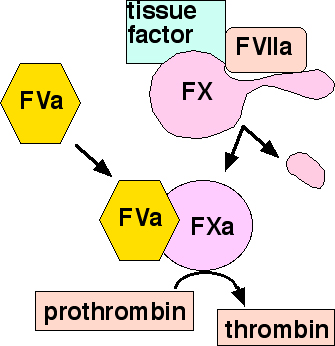Tissue factor, also known as blood coagulation factor III, is a transmembrane protein that is important for blood clotting (1). Tissue factor can bind coagulation factor VII, resulting in the activation of its protease activity and leading to fibrin clot formation (2).
The multi-protein complex of tissue factor and factor VII is not normally exposed to the blood. However, upon rupture of blood vessel walls, factor VII has access to coagulation factors IX and X and can activate their protease activities. Other proteins can act to inhibit the factor VII protease complex (3). This inhibition is one of the identified points for dis-regulation of blood clotting that is observed during use of oral contraceptives (4). Tissue factor pathway inhibitor (TFPI) levels are reduced, apparently contributing to the increased risk of thrombosis associated with the use of oral contraceptives.
Based on experiments with mice, it has been suggested that factor VII can act through protease-activated receptor 2 (PAR2) to regulate skin wound healing (5), which seems to be an example of a direct signaling function of factor VII, independent of factor X activation. Similarly, there is evidence that tissue factor can function to transduce signals into cells (6).
Related reading. Molecule of the Month
Blood Coagulation: Hemostasis and Thrombin Regulation


Pingback: Platelet activation | medicalneurophys